People with a light skin complexion, suffering from sun allergies, or those that have undergone dermatological treatments are more prone to sun damage than those with healthy skin. That is why it is essential to understand the effects of UVA and UVB rays in order to prevent sun damage.
The positive and negative effects of UV rays


Most people look forward to the summer and the opportunity to spend a bit of time in the sun.
It’s well known that the sun has many positive effects: sunlight helps our body to produce vitamin D – good for bones, muscles and the body’s immune system.
Its visible light stimulates the production of endorphins that are beneficial for people suffering from depression, while its infrared light helps to improve circulation, increasing metabolism and productivity.
But sunlight can be harmful, and over-exposure can lead to serious skin damage such as: premature ageing, sun allergy and even skin cancer. It’s therefore vital to protect the face and body from the negative effects of UVA and UVB rays. This is particularly important with children’s skin, which is much thinner and more sensitive, and therefore more susceptible to sun damage, than adult skin.
Read more about sun protection for children
Protecting sensitive skin from sun induced damage
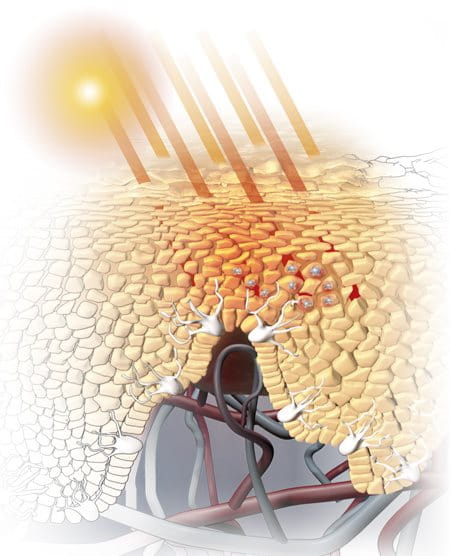
UVA radiation is present all day and throughout the day. UVA rays can pass virtually unhindered through layers of clouds and can even go through glass. They penetrate deeply into the lower skin layer (dermis) and play a major role in long-term sun damage such as premature skin ageing, sun allergy (PLE), other photodermatoses, immune suppression, indirect DNA and eye and retina damage.
UVB radiation is responsible for acute sun damage such as sunburn, direct DNA damage and skin cancers as well as eye and retina damage. UVB rays fluctuate during the day and are at their strongest around midday. While UVA rays penetrate deep into skin layers, UVB rays affect the epidermis and can cause burning and skin damage especially in summertime.
Read more how sun affects skin
Acne
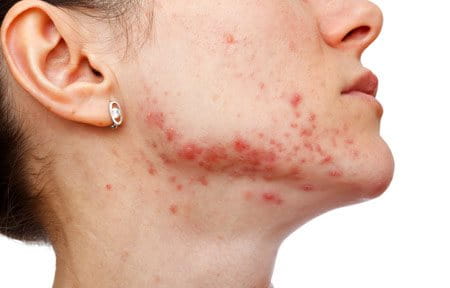
Common acne medications can also increase sunlight sensitivity. Furthermore, one of the major risks of exposing acne skin to the sun is post-inflammatory hyperpigmentation where small patches of discolouration can appear on the face following a rash, pimple or wound in the affected area. Nevertheless, some acne patients do benefit from light therapies (often blue or blue and red light treatments). Please consult a dermatologist for more information.
The sun's rays should therefore be enjoyed in moderation and with protection.
Sun fluids for oily and acne-prone skin should ideally mattify the skin and have light textures, suitable for acne skin, that don’t clog the pores.
Eucerin Sun Fluid Mattifying SPF 30 or 50+ helps protect skin against UVA and UVB. As well as filtering UV rays, its highly effective natural anti-oxidant Licochalcone A offers cellular protection technology while Glycyrrhetinic Acid protects the DNA within the core of each skin cell. An SPF (sun protection factor) of 30 or more is recommended, depending on skin’s sensitivity to the sun.
Atopic Dermatitis
In general, people affected by Atopic Dermatitis benefit from moderate sun exposure, nevertheless sunlight, wind and sand have a dehydrating effect on normal skin and dry skin gets even dryer, further aggravating conditions such as Atopic Dermatitis.
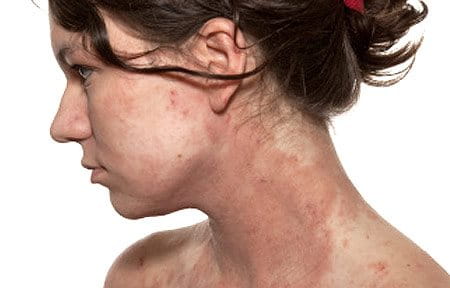
It is recommended to use a sunscreen that is suitable for the specific needs of dry, sensitive and atopic skin.
This will provide the protection and care that this problematic skin needs. Eucerin Sun Crème and Sun Lotion for Dry Skin, developed especially for people suffering from Atopic Dermatitis, protect the face and body from UVA/UVB while Licochalcone A protects skin cells in the deeper epidermal layer and Glycyrrhetinic Acid supports skin’s own DNA protection and repair.
Post-dermatological treatment
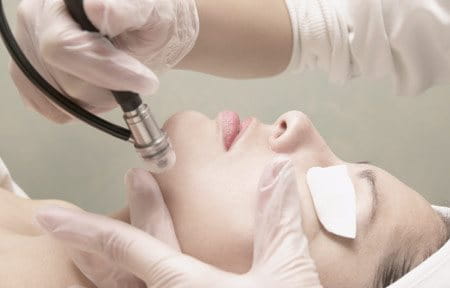
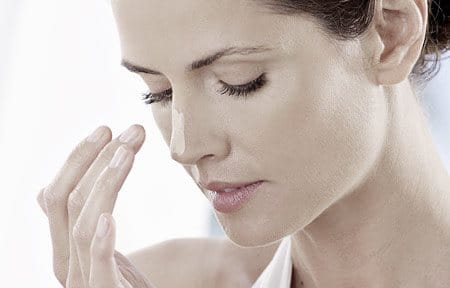
Laser therapy and chemical peeling treatments can leave skin sensitive and very irritated, making it vulnerable to photo damage.
It is highly recommended that direct sunlight is avoided following treatment and, even in the shade, the highest possible UV and SPF protection is used.
Eucerin Sun Fluid Mattifying SPF 50+ and Eucerin Sun Creme SPF 50+ are suitable for use after chemical peelings and laser treatments. They combine very high UVA/UVB plus biological cellular protection and DNA protection. The fast absorbing cream is suitable for normal to dry skin while the Eucerin Sun Fluid Mattifying SPF 30 or 50+ is suitable combination to oily skin leaving a non-shiny/non-sticky feeling on the skin. Additionally Eucerin Sun Creme Tinted SPF 50+, suitable for all skin types, is also recommended after dermatological treatments since it has natural pigments that conceal imperfections and pigmentation spots.
Sun sensitive skin

Sun sensitive or hypersensitive skin takes many forms; it can be under-developed (in the case of children), inflamed (due to a skin condition such as Atopic Dermatitis on face or body or skin diseases such as Rosacea or acne), damaged (by medication or dermatological treatments) or simply be the natural response to a person’s pale complexion. UV damage and repeated sunburn in childhood and adolescence increase the risk of developing epithelial skin cancer and malignant melanoma later in life so it is vital that protection is used from an early age. Most Eucerin sun protection products are suitable for sensitive skin and all are compliant with European Recommendation and Cosmetics Europe – The Personal Care Association (formerly called Colipa).



